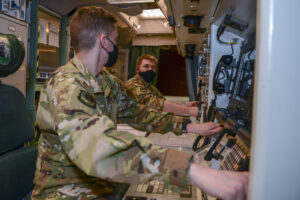The cause of the ground abort is under investigation. An Air Force official told SpaceNews that the mission will not be rescheduled at this time.
As per standard practice when there are launch failures or anomalies, the Air Force will form a “launch analysis group” with officials from Global Strike Command, the 576th Flight Test Squadron, the 30th Space Wing and the Air Force Nuclear Weapons Center.
The launch had been scheduled to take place Wednesday between 12:15 a.m. to 6:15 a.m. Pacific.
Test launches of Minuteman 3 missiles are done three to four times a year to “validate and verify the effectiveness, readiness and accuracy of the weapon system,” said Col. Omar Colbert, 576th Flight Test Squadron commander.
An arsenal of about 400 three-stage Minuteman 3 missiles make up the land-based leg of the U.S. nuclear triad of ICBMs, aerial bombers and submarines.
The Air Force for years has warned that the Minuteman 3 fleet needs to be replaced due to its age and difficulties in maintaining the systems. The missiles were first deployed in 1970, with an expected 10-year service life, and have undergone multiple life extensions.
The intended replacement is the Ground Based Strategic Deterrent, or GBSD. The Air Force last year awarded Northrop Grumman a $13 billion contract to develop GBSD but the program is said to be targeted for cuts due to concerns about its cost and questions on whether it’s needed.
Gen. Tim Ray, commander of Air Force Global Strike Command, said GBSD is needed sooner rather than later. “The Minuteman 3 is 50 years old; it’s past time to upgrade the missile systems,” Fay said in August when the Air Force announced plans to establish GBSD units at F.E. Warren Air Force Base, Wyoming; Malmstrom Air Force Base, Montana; and Minot Air Force Base, North Dakota.
Acting Secretary of the Air Force John Roth in April announced the service selected Vandenberg as the preferred location for the GBSD formal training unit.



